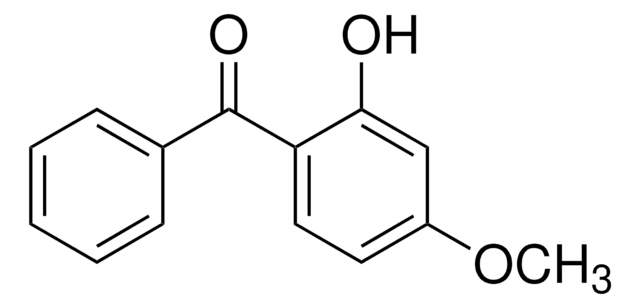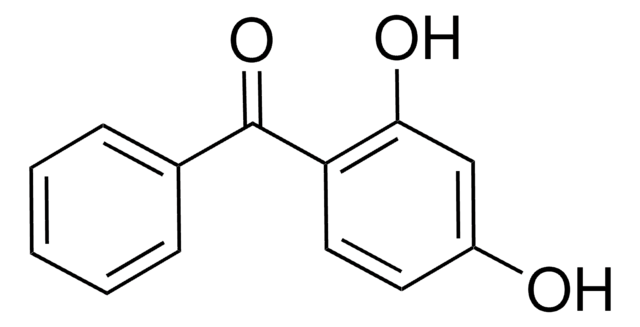1485001
USP
Oxybenzone
United States Pharmacopeia (USP) Reference Standard
Synonym(s):
2-Hydroxy-4-methoxybenzophenone, Oxybenzone
About This Item
Recommended Products
grade
pharmaceutical primary standard
API family
oxybenzone
manufacturer/tradename
USP
bp
150-160 °C/5 mmHg (lit.)
mp
62-64 °C (lit.)
application(s)
pharmaceutical (small molecule)
format
neat
SMILES string
COc1ccc(c(O)c1)C(=O)c2ccccc2
InChI
1S/C14H12O3/c1-17-11-7-8-12(13(15)9-11)14(16)10-5-3-2-4-6-10/h2-9,15H,1H3
InChI key
DXGLGDHPHMLXJC-UHFFFAOYSA-N
Looking for similar products? Visit Product Comparison Guide
General description
Application
- Dioxybenzone and Oxybenzone Cream
- Dong Quai Root
- Dong Quai Root Powder
- Oxybenzone
- Sichuan Lovage Rhizome
- Sichuan Lovage Rhizome Powder
- St. John′s Wort Flowering Top
Analysis Note
Other Notes
Signal Word
Warning
Hazard Statements
Precautionary Statements
Hazard Classifications
Aquatic Acute 1 - Aquatic Chronic 2
Storage Class Code
13 - Non Combustible Solids
WGK
WGK 2
Flash Point(F)
212.0 °F - closed cup
Flash Point(C)
100 °C - closed cup
Regulatory Listings
Regulatory Listings are mainly provided for chemical products. Only limited information can be provided here for non-chemical products. No entry means none of the components are listed. It is the user’s obligation to ensure the safe and legal use of the product.
ISHL Indicated Name
Substances Subject to be Indicated Names
ISHL Notified Names
Substances Subject to be Notified Names
JAN Code
1485001-150MG:
Certificates of Analysis (COA)
Search for Certificates of Analysis (COA) by entering the products Lot/Batch Number. Lot and Batch Numbers can be found on a product’s label following the words ‘Lot’ or ‘Batch’.
Already Own This Product?
Find documentation for the products that you have recently purchased in the Document Library.
Our team of scientists has experience in all areas of research including Life Science, Material Science, Chemical Synthesis, Chromatography, Analytical and many others.
Contact Technical Service




